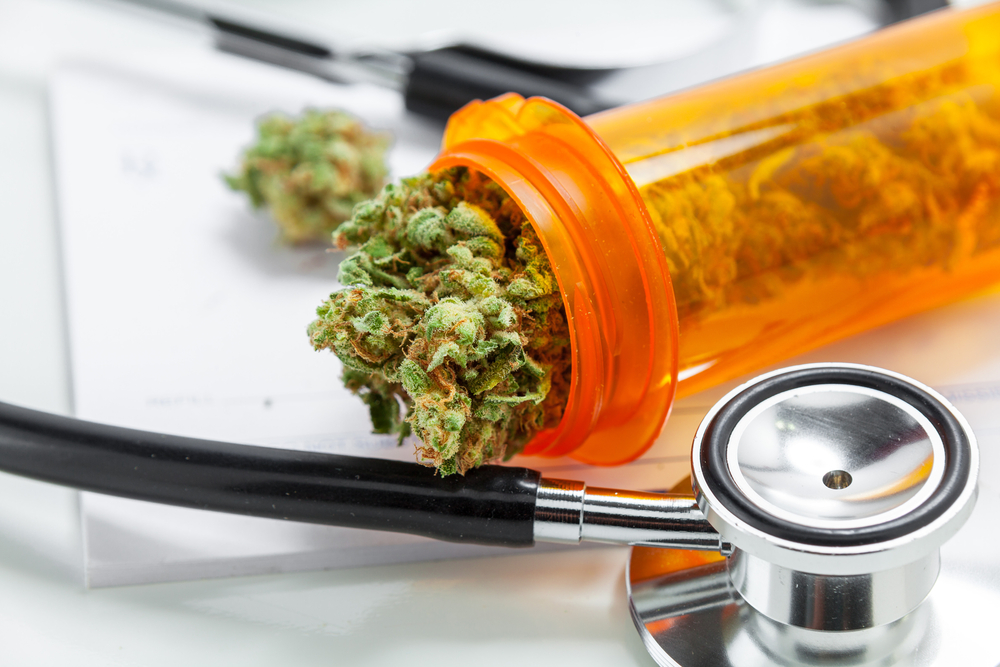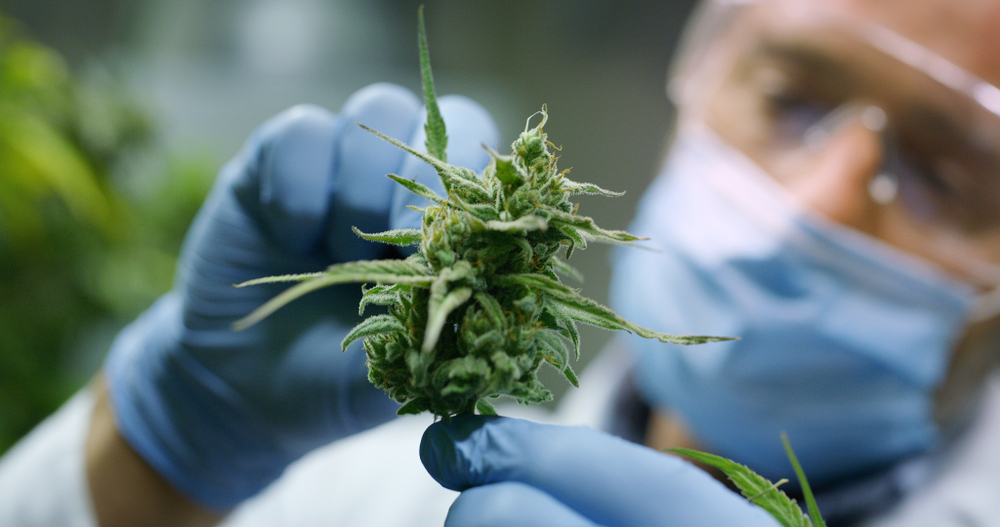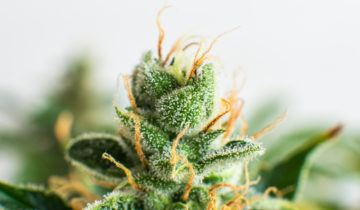You may have seen the word cannabinol (shortened to CBN) floating around online.
For those without a chemistry degree, trying to figure out what it is can seem daunting.
Everybody and their mother now know about THC and CBD. CBN is far less known, but that is changing fast. Even researchers aren’t certain, but there’s already a growing body of knowledge that seems to support its medicinal properties.
So what is CBN and how can you use it? Is it safe? Will CBN get you high?
Let’s find out.
What is Cannabinol?

Cannabinol (CBN) is totally natural and normal. It is usually barely present in the dried flower you buy. That said, the amount inside your bud can increase over time. This is because THC degrades or breaks down to form CBN.
Cannabinol is not created by the plant while it grows, but forms as the bud ages. This is why we store our weed in airtight containers in spots that are dark and cool.
THC produces the psychoactive and euphoric effects so many of us seek. When THC breaks down to CBN over time, the potency is decreased dramatically. The process that creates CBN from THC is called oxidation. This process will occur very slowly under good storage conditions. Basically, this aging process reduces how effective we can get high.
Cannabinol is thought to be able to produce 10% of the effects that THC does.
Since CBN was first isolated in 1899, scientists have found seven different types of it.
However, if we expose cannabis to open-air, heat, moisture, or sunlight, this process speeds up dramatically. So make sure you know how to store your weed properly unless you want to be smoking CBN.
CBN is Normal
Any bud you’ve ever smoked has tiny amounts of CBN, usually only 0.1% of dry weight. This number can get a lot higher based on storage conditions and the amount of time passed since curing the bud.
Ever find some real old cannabis hidden away somewhere in your home?
If you smoked this product, you may have felt far more fatigued than normal. You may have had a very good sleep that night, but you probably didn’t get too high.
You’ve probably heard the term cannabinoids mentioned a bunch. Compounds like THCA, CBDA, and CBN are all cannabinoids.
When we discuss THCA, CBDA, and CBN, remember that they are all cannabinoids. They are also called phytocannabinoids because they come from plants (‘Phyto-‘ means plant).
This is opposed to endogenous cannabinoids (or endocannabinoids) which are the compounds that our bodies produce. The phytocannabinoids mimic those compounds in our body, producing all the wonderful impacts of cannabis.
CBN Research

CBN has not been studied nearly as much as THC and CBD. That doesn’t mean we know nothing.
CBN is thought to possess immunosuppressive properties. All this means is that they reduce the overall activity of your immune system. For those with immune disorders, this can be massively helpful.
For otherwise healthy individuals, it likely isn’t what we want when we consume cannabis.
CBN is likely to be included with CBD and other cannabinoids in the treatment of epilepsy and other seizure disorders.
Although researching CBN is a difficult process due to restrictions on cannabis, we are seeing a growing body of evidence to help us make good decisions.
Non-Human Research
Science often used Petri dishes and animals to do preliminary testing and research before giving a drug to humans.
This information can be helpful, but research on humans is needed before we make any substantial claims. With that said, we do have some basic ideas about what exactly CBN can do. CBN does not seem good for baby zebrafish, with negative impacts seen on embryo life cycles.
Looking at rats, CBN combined with CBD can help reduce mechanical sensitization. Think of how back muscles become more sensitive throughout your workday. The idea behind this research is that the combination may provide long-lasting reductions in painful bodily sensations.
Looking at Petri dishes, CBN seems to hold anti-tumorous abilities. Thought to be related to the regulation of cannabinoids receptors, specifically CB2, these findings are fascinating. While much more work is needed, researchers do think that CBN may be a potential option in anti-cancer therapy.
Not all results are positive, however. Another study found that CBN (also THC and CBD) promoted breast cancer cell growth in cell cultures.
Another area of research around CBN relates to pain and inflammation. CBN is an agonist of TRPV2 receptors. Don’t worry if this is gibberish to you. All it means is that there appear to be reductions in pain and inflammation from taking CBN. THC and CBD have largely gotten all the attention so far, but interest in CBN is growing. Expect to see much more content on CBN as it gains traction as a potential therapeutic compound.
A quick reminder that these are very early studies, and should not be taken out of context. We can’t yet say that CBN will definitely have any particular benefit for humans.
One very likely candidate is the promotion of sleep, but research is needed to support such a claim. Basically, we don’t know enough. While we wait for further evidence, let’s see what else we do know.
Potential Benefits
While CBN won’t get you more than mildly high, it does seem to have potent sleep-promoting impacts.
We do not have human research to know what benefits actually arise from consuming CBN. That said, CBN appears to help with the management and treatment of:
- Pain
- Appetite
- Bone Cell Growth
- Insomnia
- Cancer
- Epilepsy
- Glaucoma
- Rheumatoid Arthritis
- Crohn’s Disease
The broader properties of CBN relate to being:
- Antibacterial (particulary the MRSA bacteria)
- Anti-inflammatory (less inflammation)
- Anti-convulsive (fewer seizures)
- potent sedative (time for bed)
CBD vs CBN?

Cannabinol (CBN) and Cannabidiol (CBD) are two different compounds with different actions and impacts. If you’ve confused them for one another, you’re not alone! As we mentioned, CBN forms during the aging process of THC.
When CBD ages, it does not produce CBN. So these are two unique biological pathways to get to them. CBD is like THC, in the sense that both exist in their acidic form in the plant. With heat, through a process called decarboxylation, THCA converts to THC and CBDA to CBD.
CBDA can be found in high quantities in some strains, with others possessing almost none.
CBN can also be found in dried flower, but this is due to the aging process. CBN usually forms very slowly, although this rapidly speeds up when exposed to heat.
The side effects of CBN and CBD are similar. We do not know if CBN will also cause diarrhea and headaches like CBD can cause in large doses.
For those consuming CBD, you likely won’t get those crappy side effects unless you consume doses much larger than normal on the recreational or health/wellness side of things.
Those using CBD for medical conditions often take does many times more potent than recreational CBD products. CBN may join the ranks of CBD as a medicine for Epilepsy, but not just yet. There are potential benefits to combining the two, such as longer-lasting impacts.
A Comparison of CBN and CBD Effects
Since these two compounds have different chemical structures, they interact with our bodies differently. If THC and CBD are cousins, then CBN would be the oldest child in the THC family. CBN would be comparable to the older sibling of CBD, CBDN. We’ll discuss how these different designs impact the effects of CBN before talking more about psychoactivity and symptom management.
CBN has one extra smelly ring, which is why it breaks down more slowly in the body. This is also why it doesn’t have the exact same effects as CBD. It also explains why CBN may be useful for promoting longer-lasting effects for your cannabis oil dose.
It may be better to avoid a mixture with CBN during the day, but using it instead for your nighttime dose. We know little about the potential entourage effect from including CBN into the mix, but there are potentially beneficial synergies. We also don’t know which terpenes may have better synergies with CBN compared to CBD or THC.
CBN is only mildly psychoactive and lacks the euphoric punch of THC. The same could be said for CBD, which is non-impairing but can potentially reduce stress, anxiety, and pain problems. While CBD is also used to manage sleep, inflammation, seizures, and more, we cannot say the same with CBN at this point in time. CBD is better suited for daytime dosing, while CBN is better for before bed.
The Future of Cannabinol
As more research is done on CBN, we’ll develop a better understanding of when and where it could be helpful. We should also increase our knowledge of the side effects and risks of CBN consumption.
Although the science behind CBN is not entirely concrete yet, Cannabinol has been anecdotally effective in treating
- Pain
- Appetite
- Bone Cell Growth
- Insomnia
- Cancer
- Epilepsy
- Glaucoma
- Rheumatoid Arthritis
- Crohn’s Disease
If you’re suffering from any of these ailments, give CBN a try. It’s not any more dangerous than CBD or its psychoactive cousin, THC and you might find that it’s even more effective than the other 2 alternatives.




 No products in the cart.
No products in the cart.